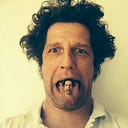Ode to the prototype
Of all the concepts and tools of the UX trade, one I am dearly fond of is the notion of “prototype”.
We think of a prototype as an artefact, but it really is a status: when something is a prototype, it means it is an attempt, something that is not “quite there yet”. It may also mean it is a fragment, a part in a greater whole.
Either way, it allows to progress inside the design of a product in steps, exploring the solution space, question after question.
A prototype is a question, embodied.
— Diego Rodriguez, Ideo
It is an investigation tool. Prototypes are not-quite-right-but-not-totally-wrong answers, the contrary to the manichean, boolean thinking expected by people who believe in “genius”, who never have doubts (perhaps because they never have questions). Prototypes reflect on the complexity of thinking in dynamic systems of interaction by providing a system to represent intermediary states. When I look at my children playing, drawing, most of the time, they are prototyping.
In my trade, prototypes usually start with pen and paper, and gradually become digital artefacts, evolving from low fidelity to high fidelity and eventually reaching a “final” status, the end product of bits and codes shipped on golive day.
Final is not “done”.
For things that live on the internet, there is no final. Or rather, final often refers to the state of something that is left online to rot. For some products, it is version 53.4.6, while others become “final” at version 11.0.9600.17843 (web builder, can you guess which software’s “final” version number that is?).
You can only know that a digital product is in its final stage because no one care for it anymore. It is hanging there, but not morphing anymore. Terminated.
What am I the prototype of ?
Speaking of “dynamic systems of interaction”, there is an interesting ontological framework in this notion of “prototype” as an analogy to our life, our “being there”.
Of course we are not prototypes. We are Nature, embodied, perfect in our own ways. But do we feel that way? Do you feel perfect, done, whole ?
I for one have never felt much more than a prototype, an incomplete, sketchy version of something supposedly perfect, in some weird way. Maybe you can relate to that, maybe you do not. It is okay.
Let us be hypotheses.
From the perspective of time, are you today the result of what you planned for yourself yesterday? In that sense, are you today a prototype of what you will be tomorrow? If that is so, is your corpse the end-product?
Or is how I die the end product? My holy book’s Final Judgement? What my internal self, my soul will crystalize into when I face the very last sensation at the moment of seizure ?
What if the “final” product is not the last moment of your life, but the entire journey of all the doing, the thinking and the being you have done since your birth? Welcome, religions of the Holy Book(s)…
He wanted his friends to realize that life is a journey and not a destination; that the heart must be set upon those matters of character which are eternal and not upon those matters of sensation which pass away. — pastor Lynn H. Hough
In a scientific perspective, the product might be our gene pool. Was Homo australopithecus a prototype of Homo Abilis, and him a prototype of Homo Sapiens? Are we prototypes of the next version of our species?
We will never know for sure, I guess. Perhaps there is no answer: everything that lives is an unfolding, not a conclusion.
To be alive is to be perfectible. A prototype.
If prototyping is your thing too, I strongly recommend IDEO’s Zine issue 1, free PDF download here.
